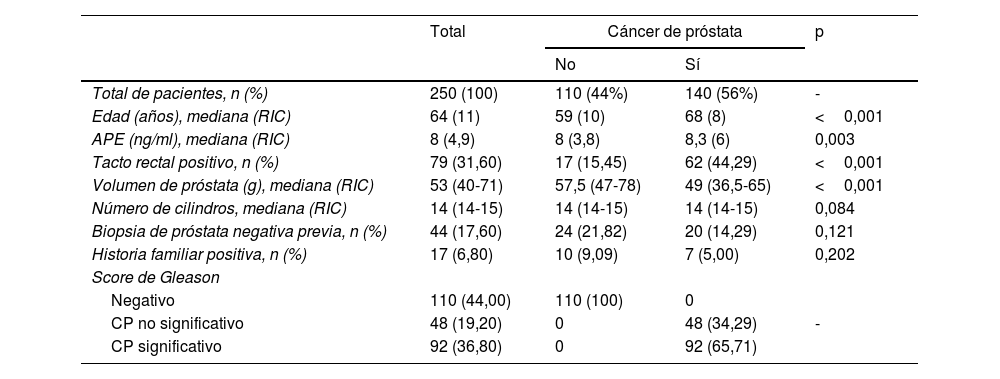Comparar el desempeño de las calculadoras de riesgo del European Randomised Study for Screening of Prostate Cancer (ERSPC-RC) y el Prostate Biopsy Collaborative Group (PBCG-RC) en predecir el riesgo de presentar cáncer de próstata clínicamente significativo.
Material y métodosRetrospectivamente, se identificó a los pacientes que fueron sometidos a biopsia prostática en el Sanatorio Allende Cerro, Ciudad de Córdoba, Argentina, desde enero de 2018 a diciembre de 2021. Se calculó la probabilidad de tener cáncer de próstata con las dos calculadoras por separado y luego se compararon los resultados para establecer cuál de las dos tuvo mejor desempeño. Para esto, se analizaron áreas bajo la curva (ABC).
ResultadosSe incluyeron 250 pacientes, 140 (56%) presentaron cáncer de próstata, de los cuales 92 (36,8%) tuvieron cáncer de próstata clínicamente significativo (Score de Gleason ≥7). Los pacientes que presentaron cáncer tenían mayor edad, mayor valor de antígeno prostático específico (PSA) y menor tamaño prostático. El ABC para predecir la probabilidad de tener cáncer de próstata clínicamente significativo fue de 0,79 y 0,73 para PBCG-RC y ERSPC-RC, respectivamente (p=0,0084).
ConclusiónEn esta cohorte de pacientes, ambas calculadoras de riesgo de cáncer de próstata mostraron un buen desempeño para predecir el riesgo de cáncer de próstata clínicamente significativo, si bien el PBCG-RC mostró mejor exactitud.
To compare the performance of the risk calculators of the European Randomized Study for Screening of Prostate Cancer (ERSPC) and the Prostate Biopsy Collaborative Group (PBCG) in predicting the risk of presenting clinically significant prostate cancer.
Material and methodsRetrospectively, patients who underwent prostate biopsy at Sanatorio Allende Cerro, Ciudad de Córdoba, Argentina, were identified from January 2018 to December 2021. The probability of having prostate cancer was calculated with the two calculators separately and then the results were compared to establish which of the two performed better. For this, areas under the curve (AUC) were analyzed.
Results250 patients were included, 140 (56%) presented prostate cancer, of which 92 (65.71%) had clinically significant prostate cancer (Gleason score ≥7). The patients who presented cancer were older, had a higher prostate-specific antigen (PSA) value, and had a smaller prostate size. The AUC to predict the probability of having clinically significant prostate cancer was 0.79 and 0.73 for PBCG-RC and ERSPC-RC respectively (p=0.0084).
ConclusionIn this cohort of patients, both prostate cancer risk calculators performed well in predicting clinically significant prostate cancer risk, although the PBCG-RC showed better accuracy.

















